USF World News
Catching up with USF's Kalam Fellows
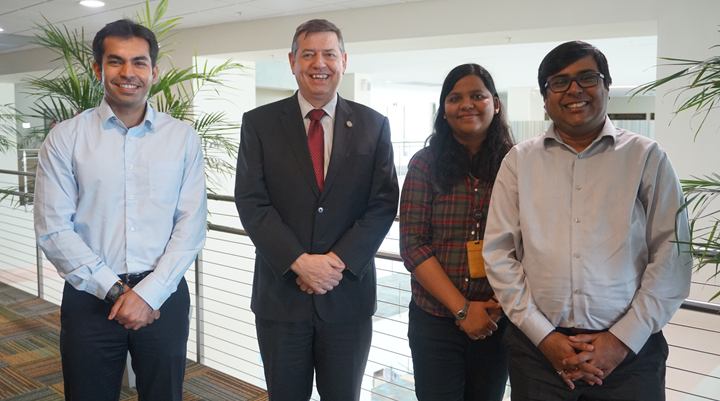
Kalam fellows Arjun Kadian (left), Veena Subramanian (center-right), and Avijit Sengupta (right) stand with former USF World Vice President, Dr. Roger Brindley, in 2019.
By Aruna Dasgupta
TAMPA, FL (July 11, 2024) -- In recognition of the ninth anniversary of President Avul Pakir Jainulabdeen (A.P.J.) Abdul Kalam’s passing on July 27, 2015, USF World reconnects with three USF Kalam Fellows: Avijit Sengupta (PhD-Business Administration and Management, 2021); Veena Subramanian (PhD-Cellular and Molecular Biology, 2022); and Arjun Kadian (PhD-Business Administration, 2023).
The USF President "A.P.J. Abdul Kalam Postgraduate Fellowship," is named after India’s beloved former President who visited the university in 2012. Dr. Kalam was a highly respected aerospace scientist and popularly known as “India’s Missile Man.” You can read about the Kalam Fellowship in this USF World post.
Sengupta, whose research at USF focused on developing a high-fidelity prototype of a home-based cardiac rehabilitation (HBCR) system to support self-management of chronic cardiovascular diseases, is currently a lecturer at the Business School of the University of Queensland in Brisbane, Australia. Subramanian, who studied a rare genetic disorder while at USF, last year joined the University of Utah in Salt Lake City, as a research scientist and is studying the effects of virus infection on muscle tissue. Kadian, whose time at USF was spent understanding consumer behavior on IT platforms, is now an Assistant Professor in the Department of Information Systems and Business Analytics at the Florida International University in Miami, Florida.
As the first USF Kalam Fellow, Sengupta, who graduated from the Indian Institute of Technology Bombay in Mumbai, got a lot of media attention in India. In one interview, Sengupta said: “This is an incredible honor as I am a huge fan of our ex-president in whose name the fellowship has been instituted.” In fact, this sentiment was the first reaction of all the Fellows – not surprising given the near-cult status of Dr. Kalam among young Indians even today.
As Subramanian says: “Growing up in India, Dr. Kalam was a great inspiration to me as he is to millions of Indians… His journey from humble roots to the top echelons of India’s space organization was a fascinating one. I have read about Dr. Kalam extensively and had the good fortune to meet him when he paid a visit to my high school. In the words of Dr. Kalam, it is important to dream, dream, dream; as dream transforms into thoughts and thoughts result in action. His words have been a true inspiration for me.”
“Dr. A.P.J. Abdul Kalam has always been a role model to me,” says Kadian. “His books – Ignited Minds and Wings of Fire -- inspired me to dream big and work hard to pursue my goals in the field of science and technology. Inspired by his vision to empower the youth through education, in 2011, I undertook the responsibility of teaching 20 underprivileged children at St. Aloysius Boys Home in Mangalore and this gave me immense satisfaction."
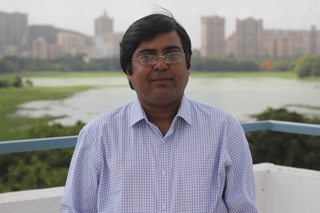
Sengupta’s research at USF was “motivated by a desire to change the lives of underserved people.” He details his thesis theme: "While the population of coronary heart disease (CHD) patients requiring cardiac rehabilitation continues to expand, lack of access and other barriers to center-based cardiac rehabilitation presents a huge challenge. A mobile phone and wearable device-based technological system can offer an HBCR program for CHD, combining human-expert intelligence with machine intelligence."
Selected from some 70 applicants who applied for the first Kalam Fellowship, Sengupta chose USF for his PhD because the program brought together his “passion for technology, behavioral science theory, scientific methodologies, independent thinking and design science principles.” At Queensland he is working on health analytics, with his core concern remaining the same – “how can my work help those who do not have easy access to basic facilities?”
Subramanian’s journey has been on a rather different trajectory from her fellow Fellows. “I was starting my Ph.D. program in Cell and Molecular Biology at the Indian Institute of Sciences in Bengaluru when I received the Kalam fellowship,” she recalls. “It was very motivating, boosted my confidence and helped me channel all of my energy into doing research work.”
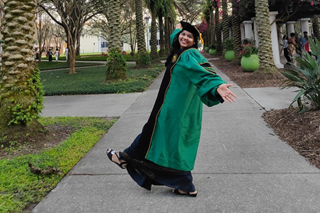
At USF, her dissertation focussed on Bloom syndrome, a rare genetic disorder that is associated with increased cancer predisposition. “My current work at the University of Utah is not a follow-up, but I am using many of the techniques and skills I learned during graduate school. I am working as a Research Scientist with Dr. Gabrielle Kardon on an alphavirus called Ross River virus that causes debilitating musculoskeletal diseases in humans.”
Kadian, the last to receive the scholarship, was already a Master's student at the Muma School of Business when he applied. His research at USF explored topics such as consumer behavior on IT platforms and the impact of organizational initiatives on IT workers' performance, productivity, and wages.
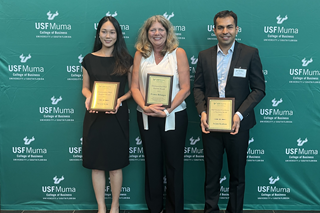
Speaking to USF World a few days ago, Kadian says: “I am truly fortunate to have an opportunity to pursue my passion for research and teaching in the Department of Information Systems and Business Analytics, at Florida International University. It’s a great place to build on the research that I started at USF.” What is common between the three Kalam Fellows, is warm nostalgia for their days at USF.
Sengupta’s fond memories of USF include “the everyday classes, interactions with my peers and professors, those job-hunting days….and even the pandemic experience.” He is thankful for the challenges too. “The journey from India to America and then to Australia was not easy…but they were opportunities which I received and embraced. Now when I look back, I recognize that I enjoyed taking risks and I am not unhappy about that. It reminds me of that famous dialogue in Forest Gump, ‘My mom always said life was like a box of chocolates. You never know what you're gonna get.’ I am thankful to God that life is giving me a lot of surprises.”
“I was sad about leaving Florida and USF because it was like home. The thought of moving was overwhelming at first, but I am settled in now and enjoying my new work,” says Subramanian, who has a three-year-old son.
Kadian says he owes a lot to the "amazing faculty and staff at USF for their guidance, " for being very generous with their time and supportive of my research endeavors, and for giving me the opportunity to teach a variety of courses to hone my teaching skills." He does not forget to mention "the wonderful students at USF who were always eager to learn and give feedback.”
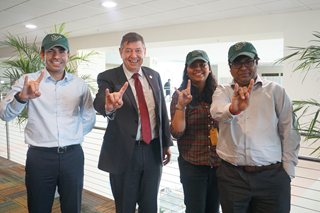
Kalam fellows Arjun Kadian (left), Veena Subramanian (center-right), and Avijit Sengupta (right) stand with former USF World Vice President, Dr. Roger Brindley, while proudly displaying their USF spirit.
The three Kalam Fellows are from different corners of India – South (Subramanian is from Kottayam, Kerala); East (Sengupta is from Kolkata, West Bengal); West (Kadian is from Pune, Maharashtra).
Their journeys are a testament to President Kalam’s belief in the transformative power of education. “Education,” he said, “is the key to unlocking the world, a passport to freedom… The ignited mind of the youth is the most powerful resource on the earth, above the earth, and under the earth.”